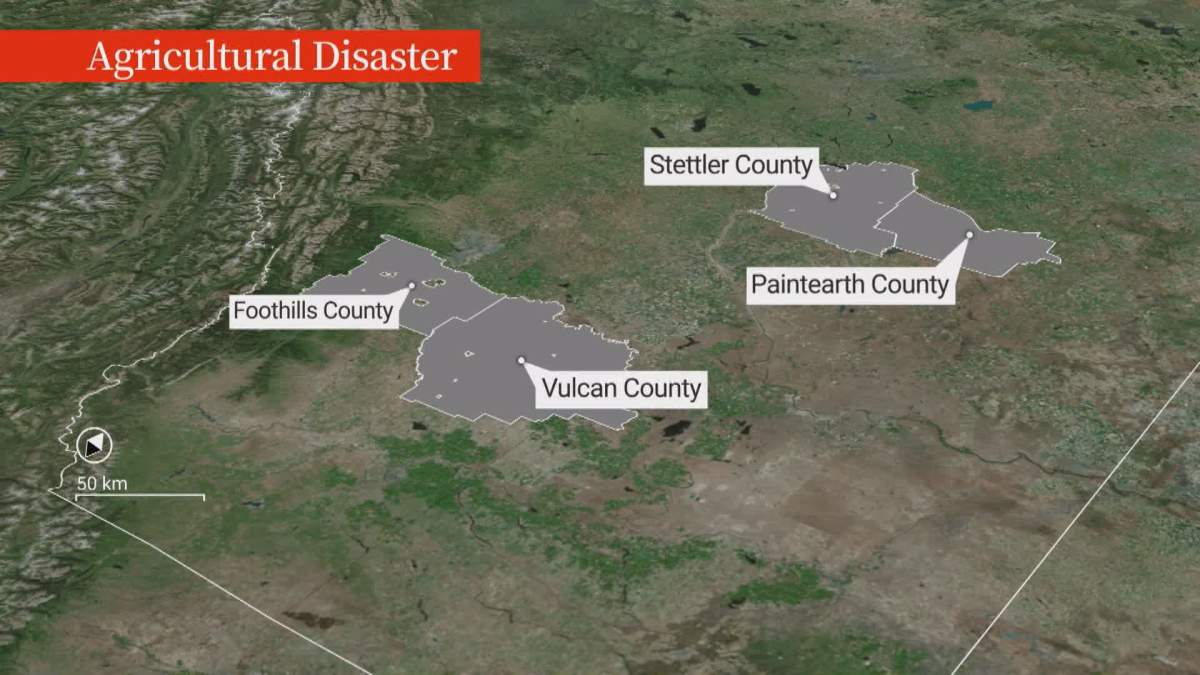A summer of wildfires, flooding and extremely dry conditions has prompted calls for further supports for Alberta farmers.

It comes after four Alberta counties declared states of agricultural disaster due to poor growing conditions impacting this season’s crops.
Alberta’s Opposition NDP launched a call Monday for the government to compensate agricultural producers struggling with the fallout from this year’s natural disasters in the province.
“The ask is that the provincial and federal government meet this week and come out at the end of this week with a plan to support producers,” said Heather Sweet, NDP agriculture, forestry & rural economic development critic.
“(The province) needs to request the ability to start accessing AgriRecovery and AgriStability funding for our producers.”
AgriStability is a program for Canadian producers to help with large declines in farming income due to production loss, increased costs and market conditions.
However, AgriRecovery is a framework between the federal and provincial governments to determine cost sharing for disaster recovery initiatives.
“While this UCP government has only released funding to offset costs of wildfire damage for municipalities and settlements, this funding excludes agricultural producers from receiving aid,” Sweet said.

According to the most recent Agricultural Moisture Situation Update from the province, most land around northern Alberta received at least 10 mm of rain last week, with some areas seeing 20 mm near the Peace region.
The update said northwest and central regions only received modest amounts of rain, between five and 10 mm.

Get daily National news
“This was probably just enough to sustain current yield potentials, but more rain will be needed soon in these areas,” the update said.
Meanwhile, many areas of southern Alberta saw little to no rain over the last week, a continued trend that’s caused some concern for farmers in the area.

Stephen Vandervalk, a fourth-generation farmer near Fort McLeod, said his canola crop is a “total wreck” while his barley crops yield will be close to a quarter of a normal crop.
Vandervalk said he’s spent $600,000 in crop insurance premiums this year.
“Last six of the last seven years, we’ve dipped into crop insurance,” he said. “I’ve been farming for 25 years, never happened before.”
Drought conditions in southern Alberta have also had an impact on the province’s beef industry, with many producers forced to move or downsize their herd due to a lack of feed this year.
Brodie Haugan, chair of the Alberta Beef Producers, said the organization monitors feed inventories and the amount of cattle going to auction weekly.
“It’s a very complex ball of wax that we’re trying to unravel right now and work the province as much as we can to keep the conversation moving so that we’re communicating with producers that need help, but at the same time making sure we’re doing the best things possible for our industry,” Haugan told reporters at the Alberta Beef Producers Summit on Monday.
Alberta’s Agriculture and Irrigation Minister RJ Sigurdson said the province is looking into a number of options for relief, but confirmed he has written a letter to the federal government requesting an AgriRecovery assessment.
“We want to make sure that we explore every option to be able to provide the most relief possible to our producers here in the province,” he said.

According to the Government of Canada, an assessment will determine what actions producers must take to mitigate the impact to their operation, and assess the needs of producers to resume operations, including if financial assistance may be required to deal with the cost of recovery.
Sigurdson also announced the province is raising individual and joint membership loan limits for Alberta’s Feeder Associations Loan Guarantee Program from $2 million to $3 million.
The province said the need comes as cattle prices have increased 25 per cent since the start of the year and “are expected to keep rising.”
- Calgary residents worried new McDonalds will affect ‘congestion, crime, safety’
- Calgary family keeps holiday spirit alive after devastating fire
- Calgary’s GlobalFest pauses ticket sales as affordability, politics squeeze festivals
- No charges will be laid against civilian pilot who violated G7 airspace during summit









Comments